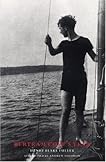
Bertram Cope's Year
"'Oh,' thought Randolph, 'one of the cool boys, and one of the self-sufficing. Probably a bit of an ascetic at bottom, with good capacity for self-control and self-direction. Not at all an uninteresting type,' he summed up." (p 33)
My favorite novels from late nineteenth-century America include Stephen Crane's The Red Badge of Courage which I first read while I was attending high school, and Harold Frederic's less well-known The Damnation of Theron Ware which deals with personal religious issues of the titular character. It was not until the end of the twentieth century when I was in my reading maturity that I discovered this somewhat similar and equally good novel by Henry Blake Fuller.
Fuller, who was born in Chicago and spent most of his life there wrote many novels , most of which are forgotten today. His novel of Chicago, The Cliff Dwellers, is probably his best known, but late in his life in 1919 at the age of sixty-two he published Bertram Cope's Year about a young (twenty-five year old) English instructor at a Middle Western university (admittedly modeled after Northwestern University). Cope is good looking and a pleasant companion. Early in the novel he is adopted socially by a local hostess, Medora T. Phillips, and begins regular attendance at her soirees. He also makes another acquaintance, Basil Randolph, who is a collector of objects d'art and admirer of handsome young men. Cope's involvement with these characters and their crowd leads him into complicated social situations with young women who pursue him, unaware of his attachment to a young man, Arthur Lemoyne. Cope had left Lemoyne in Wisconsin when he moved to Churchton but following some correspondence soon expected Lemoyne to join him. The natural way that Bertram and Arthur live a life that mimics a young married couple is just one of the surprising aspects of this stylish novel of manners. It also may explain why Fuller had to publish the novel at his own expense in spite of his success with earlier efforts. As a novel of manners the book reminds me somewhat of Aldous Huxley's Point Counter Point, and like that book it does not have any truly likable characters. Cope himself, who is at the center of the novel's social wheel, is pleasant enough, but lacks a spine with which to stand up to those characters (too numerous to mention) who try to direct his life. One aspect of this and the novel as a whole is that of unmet expectations, Cope does not meet the expectations of the other characters and in this he disappointed this reader as well.
However, as Edmund Wilson said in the introduction to the Triangle Classics edition of the novel, "This curious book, which is perhaps Fuller's best, seems never to have had adequate attention." (p. xxxi). That is a shame because it is one of the earliest natural and positive depictions of the life of a young gay man in American society. Both this and the excellence of the writing recommend this novel to all readers who enjoy understated social novels.
Bertram Cope's Year by Henry Blake Fuller. Turtle Point Press, New York. 1998 (1919)
No comments:
Post a Comment